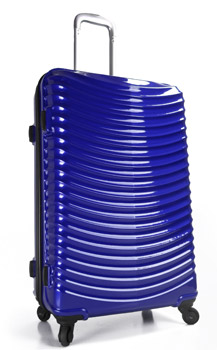Is Your Luggage bringing You Emotional Baggage?

Is Your Luggage bringing You Emotional Baggage?
It's often a last-minute item in our travel planning, but luggage can make or break our travel experience. How you take your belongings with you, knowing the rules at airports and understanding the role of airlines with regard to your luggage can be the difference between a stress-free holiday and an emotionally strung one fraught with security problems.
Anton Botha, Brand Manager at Paklite, one of Australia's longest-established travel goods companies, says, 'That most of us think about luggage at the last-minute of our travel planning means Australians aren't travelling as smart as they could be. Travellers need to research luggage options, weight allowances and security requirements to ensure their trip is as stress-free as possible, leaving more time for the important things – relaxation and adventure!"
Anton shares eight travel tips to ensure your luggage doesn't become unwanted baggage on your upcoming spring/summer trip.
Choose luggage that's instantly recognisable. A bold-coloured case is a better security option, Anton says. 'Despite the options available on the market, the majority of Australians travel with black luggage. These take longer to identify on a luggage carousel, especially when most of us are tired after a long-haul flight. The longer your case sits on that carousel, the greater the chance that someone else has taken off with it. Bright-coloured luggage may also deter thieves, as they're less likely to take off with an item that attracts attention."
Keep valuables and personal documents out of check-in luggage. 'If you can't live without it, pack it in your cabin luggage. Electronic storage devices don't only hold a monetary value, but also a lot of personal photos, memories and information that's priceless," Anton says. Never put personal information in your check-in luggage either. 'Any information that identifies you and reveals your hotel or contact details should be carried in cabin bags only. If your luggage does get into the wrong hands, thieves cannot track you or steal your identity. Your name and flight number on your luggage tags will be sufficient for airline crew to track you down if you and your luggage are separated."
Choose a case with TSA security locks. TSA locks meet the high standards of the US Transportation Security Administration. These locks enable security staff to access your luggage for inspection, as airline security at all US and UK airports hold a universal key. Security staff have the right to break non-TSA locks if inspection is required, often rendering the luggage defective.
Make claims against damage within 24 hours. Most travellers don't realise they may be able to make claims against luggage damaged in transit with their airline – even without having travel insurance. 'Be sure to make the claim immediately. The airline is less likely to resolve the issue if you've waited more than 24 hours or have already left the airport," Anton says.
Research costs for large check-in items. Check that your airline allows you to check in prams, surfboards and other large accessories free of charge. 'Some airlines do charge a fee. Even if they don't, make sure they're not charging you more elsewhere – such as in the overweight baggage fee."
Check luggage weight limits and costs. It's easy to get caught out and pay unexpected fees for overweight bags. For long-haul travel, be sure to check weight allowances and costs across all your interconnecting flights, as limits vary between airlines. 'Children are often given the same weight allowance as adults - take advantage of this and store any excess items in their luggage, if needed," Anton says.
Pack to ensure priority items are easy to reach. To save time checking-in, ensure all electronics are placed at the top of your luggage as these must be removed before passing through customs. 'It's also a good idea to keep items you may need immediately when reaching your destination, such as a jacket or raincoat, at the top of your case," Anton says.
Tailor your luggage to your destination. Hard cases, such as Paklite's Cyborg range, are the most stylish, durable and lightest option. They are ideal for air travel – they will keep your belongings safe when the case gets knocked about – and will look the part at 5-star hotels, cruises and resorts. Soft cases, as the name suggests, can be a little bit more forgiving when it comes to squeezing in-between train seats, through narrow passageways, and into aircraft overhead cabins. An example is Paklite's Flightweight range which can fold completely flat for ease of storage. If you are keeping your luggage with you most of the time – such as when backpacking or during adventure travel – duffels and backpacks are the most comfortable option.
MORE



